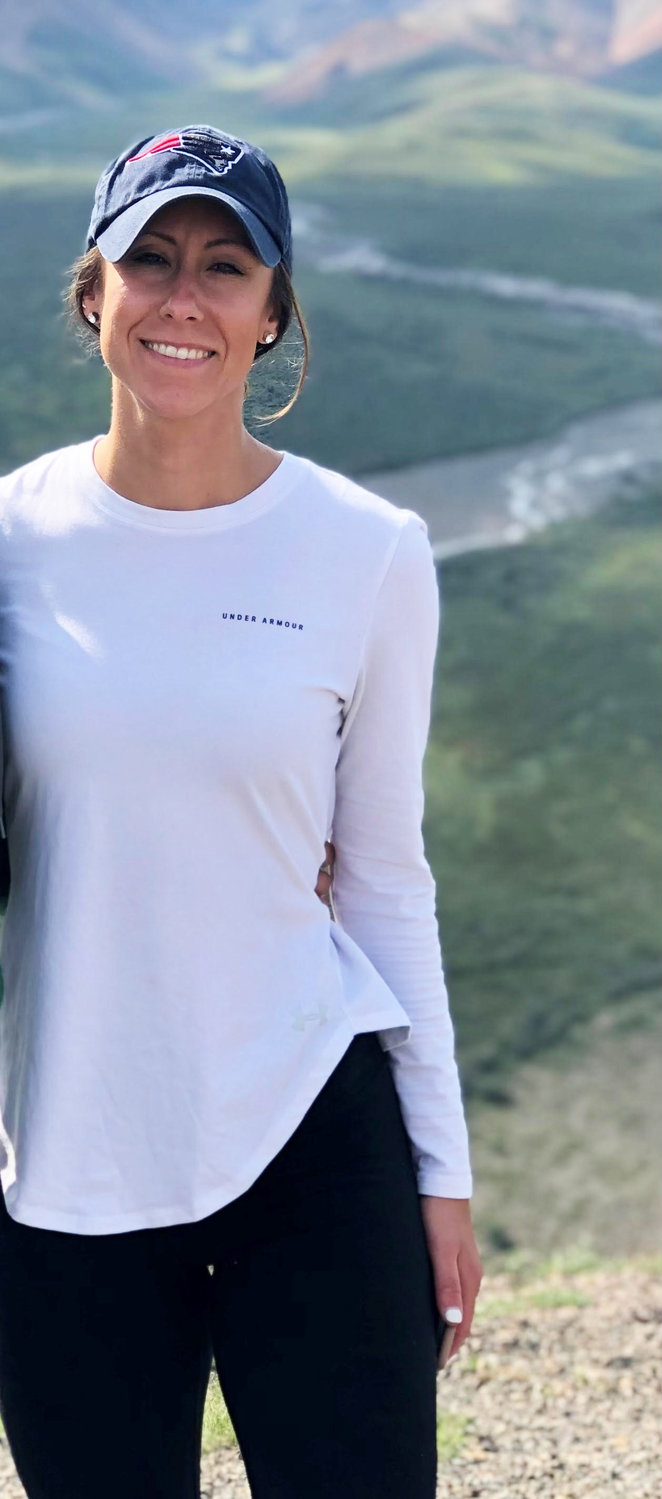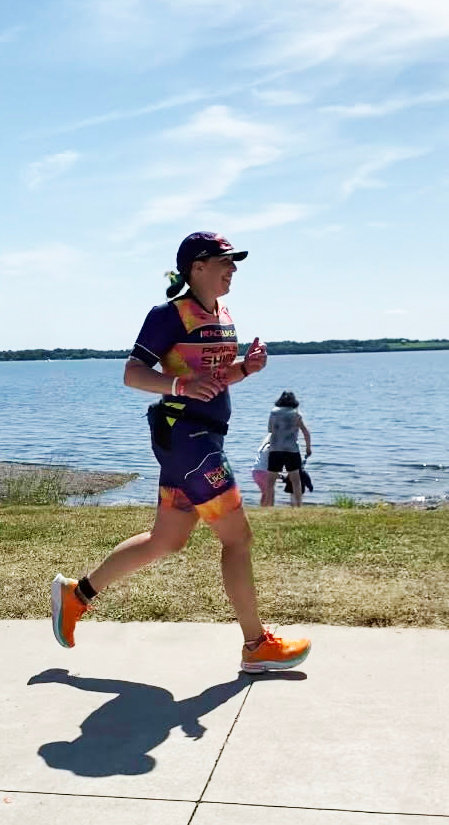Running for your life
Two physical therapists weigh in on proper training and best practices for competitive, long distance running
When I was in high school, I ran cross-country, which I was terrible at, to be honest. I ran on the junior varsity team for three years. The only time that one of my parents showed up to watch me run, as part of a state invitational meet, I came in dead last – for which I received an award from my coach at the end of the year team festivities.
There is an important lesson in humility to be found in coming in last among several hundred runners, to be made fun of by your teammates, to learn not to take yourself so seriously, and to celebrate failure. The important lesson to be learned is to be willing to run the next race, with a sense of pride, where you actually placed in the top five runners.
WAKEFIELD – On Oct. 6 and 8, the IronMan World Championship will take place on the island of Kona in Hawaii, featuring hundreds of the world’s elite triathlon athletes, competing on a 2.4 mile swim course, a 112-mile bike course, and a 26.2 mile marathon running course.
As part of the festivities, the IronMan World Championship will feature an Ironman Sports Medicine Conference, expected to be attended by more than 200 medical professionals, to be held from Oct.2-7 at the Outrigger Kona Resort.
Two physical therapists from Ortho RI, Ellen Girouard and Christine Saleeba, will be attending the medicine conference, where they will be using the experience to fine tune their newly designed running program, in order to build an endurance training program designed to help reduce the incidence of running injuries.
Here is the ConvergenceRI interview with Girouard and Saleeba, talking about the design of their new, innovative running program at Ortho RI – and the opportunity to attend the IronMan Sports Medicine Conference and work in the medical tent.
ConvergenceRI: How did this project come about? What prompted it?
GIROUARD and SALEEBA: Our passion for this program came from personally training for marathons, triathlons, and developing our practice in orthopedics physical therapy over the past six-plus years.
We began designing this running program after collaborating on a weekly basis about our personal nutrition and training goals.
It wasn’t long before we realized the volume of information we had gathered was enough to begin sharing our knowledge with other providers and patients.
Eventually, we found ourselves spending countless hours researching and participating in continuing education classes to enhance our knowledge in building endurance-training programs designed to help reduce the incidence of running injuries.
The individualized framework of our running program has the ability to rehabilitate all kinds of runners and athletes with any manner of injury – and return them back to their passion.
As runners ourselves, we know the injury challenges that sometimes need to be overcome but that also lead to the highs of this sport. As treatment professionals, we want to be an integral part of everyone's rehabilitation journey.
ConvergenceRI: How was it influenced by your own experiences as a runner who was injured?
GIROUARD and SALEEBA: As runners, we are always feeling that itch to find the quickest solution to getting back on the course. While we all may know this is not the best long-term solution, sometimes it is easier to endure the pain – but which can lead to more long-term harm.
We have both sustained injuries, some more impactful than others, which have significantly impaired our performance – mentally, physically, and emotionally – with running.
Though it can take time to recover, we have both been successful in getting back to and maintaining our physical health, in order to continue with running, both casually and competitively.
We desire to be a resource to other runners in similar situations, and nothing gives us more satisfaction than helping others who are facing similar challenges. Running is an individual sport, but we want to apply the concept of the patient/provider team effort that will help heal any members of the injured running community.
ConvergenceRI: You will be working as volunteers in the medical tent at the triathlon in Hawaii in October, is that correct? Why choose that venue?
GIROUARD and SALEEBA: This is not just a triathlon; this is the Kona Ironman World Championships!
Qualifying for this race can be considered one of the ultimate achievements for any athlete, let alone those who are considered top contenders.
We will be attending the Ironman Medical Symposium, which will give us the opportunity to network and to collaborate with like-minded medical professionals to fine-tune our program – and to optimize our patient experience.
This symposium will further develop our knowledge on the best treatment approaches for competitive runners. The highlight of this trip will be our opportunity to volunteer in the medical tents and to work with the athletes as they compete in this grueling competition – and hopefully to help all the athletes cross the finish line.
The Kona IronMan Race is one of the most well-known races there is, and we are very much looking forward to learning from some of the best sports medicine professionals in the world.
ConvergenceRI: The future target audience, as I understand it, are school athletes and runners in Rhode Island. Where is the initial rollout planned?
GIROUARD and SALEEBA: Over the past year, we have been implementing the program on a smaller scale within our Sports Medicine team at Ortho RI.
We have treatment facilities in Providence, Wakefield, Westerly, and at our new flagship location in Warwick. Our goal is to positively impact the running community in Rhode Island through outreach with local high schools and universities, as well as partner providers interested in developing their niche to treat runners.
ConvergenceRI: From a physical therapy perspective, what are the most important takeaways?
GIROUARD and SALEEBA: Load management is key to recovery and making you into a more resilient runner. Running intensity, frequency, and duration needs to be tightly controlled and monitored, in order to reduce the risk of injury.
Every athlete’s recovery program will need to be individualized to optimize their return to both their short- and longer-term running goals.
ConvergenceRI: What is it like to be conducting collaborative research with a colleague at Ortho RI?
GIROUARD and SALEEBA: Having a collaborative team approach has made the journey so much fun. We both have put our own spin on the program, from our personal experiences and knowledge that we’ve picked up in our own careers.
We like to say that two brains are better than one, especially when designing a treatment program from scratch. We are hoping to expand this approach to other providers in the practice, who also share a passion for running.
We are very excited to see what the future holds for this program and the impact it may have on the broader Rhode Island athletic community.
ConvergenceRI: How important are creating good habits regarding runners rehabbing from injuries?
GIROUARD and SALEEBA: Good habits start right at the beginning - the sooner you practice them, the easier they will be to learn.
Within this program, we will take you through a series of tests and measures, including gait analysis, to begin to address appropriate running habits that will promote your running “comfort” and longevity, in order to help reduce the risk for injury.
ConvergenceRI: Were you surprised by any of the findings or recommendations?
GIROUARD and SALEEBA: Especially with endurance athletes, runners often worry about getting too “bulky” with muscle mass. However, the load management aspect of running is key to injury prevention and to improving speed/endurance, depending on which spectrum of running that you wish to return to.
Everyone’s plan is different; but we incorporate an appropriate level of strength training within all of our programming. A balance of strength training with running is the ideal approach to achieving athletic success.
ConvergenceRI: What questions should I have asked, that I didn’t ask, that you would like to talk about?
GIROUARD and SALEEBA: If you would like to get in touch with us to learn more about the running program, or set up an appointment, please reach out to either Ellen or Christine. See links below for contact information.
Editor’s Note: For transparency purposes, Ellen Girouard has been working as my physical therapist for the past three years. I encouraged her and her colleague to answer questions about the new running program they have developed.
Here is the contact information for Ellen Girouard, PT, DPT, OCS, and Christine Saleeba, PT, DPT:
Ellen Girouard [Wakefield], Office:[(401] 777-7000, Egirouard@orthopedicsri.com
Christine Saleeba [Providence]Csaleeba@orthopedicsri.com








